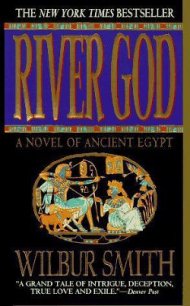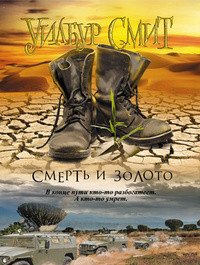Men of Men - Smith Wilbur (книги бесплатно без txt) 📗
"When I come back, we'll be richer by eighty thousand pounds," he told her, and lifted her off the ground with his embrace.
"Oh Ralph, how I wish I were coming with you."
"You know mister Rhodes has forbidden any women to cross the frontier, and you'll be a damned sight safer and more comfortable at Lily's Hotel in Kimberley with Jordan to keep an eye on you."
"Then be careful, my darling," she cautioned him, breathless from his hug.
"No need for that, Katie, my sweet. The devil looks after his own."
"These are not men coming to dig holes." Gandang stood forth from the circle of indunas. "They are dressed as soldiers; they bring guns that can break down the granite hills with their smoke."
"What did the king promise Lodzi?" demanded Bazo. at he may come in peace to look for gold. Why does he march against us like an army?"
Bazo spoke for the young men. "Oh great King, the spears are bright and our eyes are red. We are fifteen thousand men; can the king's enemies stand against us?"
Lobengula looked at his handsome eager young face.
sometimes the most dangerous enemy is a hasty heart," he said, softly.
"And at other times, Bull Elephant of Kurnalo, it might be a tardy spear arm."
A shadow of irritation at importunate youth passed behind the king's eyes; then he sighed. "Who knows?" he agreed. "Who knows where the enemy lies?"
"The enemy lies before you, great King; he has crossed the Shashi river and he has come to take your land from you," Somabula told him. And then Gandang stood again: "Let the spears go, Lobengula, Son of Mzilikazi, let your young men run, or as the sun will rise tomorrow, that surely will you live to regret it."
"That I cannot do," Lobengula said softly. "Not yet. I cannot use the assegai when words may still suffice." He roused himself and his voice firmed.
"Go, Gandang, my brother, take your hot-hearted son with you. Go to the leader of these soldiers and ask him why he comes into my lands in battle array, and bring his answer to me here."
Frederick Selous rode ahead, a trooper with an axe following him, and he pointed out the trees to be cut.
The trooper blazed them with a slash of the axe, and followed Selous on. The axemen came up behind them, fifty of them, riding in pairs. One man dismounted, handed his reins to his partner, spat on his already callused hands and, hefting the axe, addressed himself to the trunk of the doomed tree.
While his axe thudded and the wood chips flew white as bone in the sunlight, the second man sat in the saddle, his rifle in his hands, and he watched the forest around him for the first plumed head and long tasselled shield to appear. When the tree crackled and toppled, the axeman mounted and they rode on to the next, where he took his turn on guard while his mate swung the axe. Behind them the bullock spans came plodding to chain the fallen trunks and drag them out of the road, and then the whole ponderous caravan rumbled forward.
It was slow work, and on the third day Ralph rode to the head of the column to discuss with Selous the possibility of using the steam engine to haul the smaller trees, roots and all, from the sandy earth. They had left their horses with a trooper and walked forward for a better view of the way ahead when Ralph said quietly: "Stand your ground, mister Selous. Do not draw your pistol, and, in God's name, do not show any agitation."
There were dark and moving shadows in the forest all around them, and then suddenly the dreaded long shields were there, forming a wall across their front.
"Has the king killed any white ment" a deep voice challenged. "If he has not, then why has this impi of warriors crossed his border?"
Tobengula has killed nobody," Ralph called back.
"Then have the white men mislaid something of value that they come to seek it here?" Ralph said quietly to Selous. "I know this man. He is one of the king's senior indunas. The one with the red shield behind him is his son; between them they disposed of eight thousand men. It would be as well to tread warily, mister Selous. We are surrounded by an army."
Then he addressed himself to the watching and waiting warriors: "The king has given us the road."
"The king denies that he called an army to enter his domain."
"We are not an army," Ralph denied, and Gandang threw back his head and laughed briefly and bitterly.
Then he spoke again: "Hear me, Henshaw, no white man steps beyond this place without the word of Lobengula. Tell that to your masters."
Ralph whispered briefly with Selous, and then faced Gandang again.
"We will wait," he agreed, "for the king's word."
"And we will watch while you wait," Gandang promise ominously, and at a gesture the warriors melted away into the forest again and it seemed they had never been.
"Pull in the pickets," Colonel Pennefather ordered. "Put the wagons into laager. Ballantyne, can you get a message back to Tuhon the heliograph and have someone post up to Gubulawayo to find what are Lobengula's real intentions." And, as Ralph turned to hurry away, "Oh, one other thing, Ballantyne, can you start the generator and have the searchlight ready to sweep the area around the camp tonight. We don't want those fellows creeping up on us in the dark."
Gandang and his son stood together on the crest of one of the little rocky kopjes that dotted the wide hot plain between the rivers.
They were alone, although when Bazo turned his head and looked down the steep back-slope of the hill, he could see the bivouac of their combined impis. There were no cooking fires to disclose their presence to the white men; they would eat cold rations and sleep in darkness this night. The long, black ranks squatted with enforced patience, dense as hiving bees beneath the shading branches of the mopani.
Bazo knew that he had only to lift his right arm above his shield to bring them to their feet and send them racing away, silent and ferocious as hunting leopards, and the thought gave him a savage joy. Reluctantly he turned back, and stood quietly with his shield not quite touching his father's.
The little afternoon breeze coming up from the river stirred their war plumes, and they gazed down upon the laager of the white men.
The bullocks had been penned within the circle of the wagons, and they could see the field guns and the Maxim machine-guns posted at the points of the barricade, their positions fortified with biscuit boxes and Ammunition cases from the wagonloads. The gun crews lounged near their weapons, yet somehow the whole scene appeared tranquil and unwarlike.
"In the dark hour before the dawn, we could take them before they could stand to their guns," murmured Bazo.
"It would be so quick, so easy."
"We will wait on the king's word," his father replied, and then started and exclaimed.
"What is it, my father?"
Gandang lifted his assegai and pointed with it southwards, to the pale blue horizon, far beyond the Shashi river, to the faint line of hills, shaped as fantastically as the turreted towers of a fairy castle.
On those far pale hills, something flickered and sparkled, a tiny speck of brightest white light, like a fire-fly in flight, or like the twinkle of the morning star.
"The stars," Gandang whispered with superstitious awe, "the stars are shining on the hills."
The little group of officers stood behind the tripod of the instrument and focused their telescopes on the distant twinkle of light.




